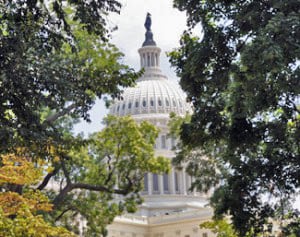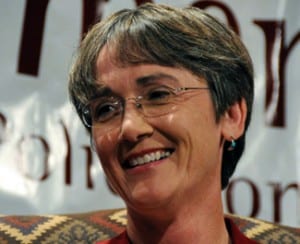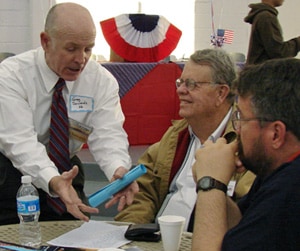
The U.S. Capitol building (Photo by Heath Haussamen)
While Heather Wilson says ‘sunlight is a great disinfectant,’ Greg Sowards says, ‘If politicians are dishonest, regulations are not going to keep them honest.’
This post continues a series on the U.S. Senate and 1st Congressional District candidates’ stances on various policy issues.
Heather Wilson says candidates should be “directly responsible and accountable for their campaigns” but supports allowing super PACs “until they are banned for everyone,” while Greg Sowards opposes restrictions on political spending.
Wilson, a Republican candidate for U.S. Senate, said she opposed the McCain-Fiengold campaign finance act as a member of the U.S. House because she thought the courts would probably rule it unconstitutional. The Supreme Court did toss out parts of the law in its Citizens United decision.
As a result, Wilson said, campaigns and parties operate within the confines of contribution limits and have to disclose funding, but no one else has to.
While she said we’re better off “if candidates are directly responsible and accountable for their campaigns,” until that happens, “My position is the same as President Obama’s: Until (super PACs) are banned for everyone, they should be allowed to operate in New Mexico.”
Sowards, on the other hand, said super PACs aren’t the problem, and neither is money in politics.
“To assume that money spent on elections is the cause of our problems in Washington is a stretch,” said Wilson’s opponent in the GOP Senate primary. “If we, the American people, have become gullible to the point where 30-second sound bites take the place of thorough candidate research, then we probably have the government we deserve, or soon will have.”
Sowards added that he doesn’t support restrictions on political spending, or disclosure requirements beyond those that already exist.
“If politicians are dishonest, regulations are not going to keep them honest,” Sowards said, though he added that he supports term limits as a way to reduce the amount of money spent on elections.
The candidates made their comments in response to questions from NMPolitics.net about the influence of money in politics and ethics reform. NMPolitics.net gave the candidates no word minimum or limit, telling them to say what they had to say. The only criterion was that they not engage in personal attacks.
Here are the questions NMPolitics.net asked on money in politics and ethics reform:
- The influence of money in federal races is arguably becoming more and more pervasive, especially with the Citizens United decision and the new prominence of super PACs. Do you view this as a good or bad thing? Why?
- Sen. Tom Udall and others are proposing a constitutional amendment that would restore the government’s ability to regulate campaign finance. Do you support that proposal? Why or why not?
- What ethics and transparency legislation would you push if elected?
Their responses, published in their entirety:

Heather Wilson (Photo by Heath Haussamen)
Heather Wilson
“I opposed the McCain-Fiengold campaign finance law because I thought it would probably be thrown out by the courts as unconstitutional. It was. As a result, we now have a hodge-podge of rules by which campaigns and parties operate within limits and must publicly disclose the sources of their funds, but no one else does.
“I think sunlight is a great disinfectant and that we are better off if candidates are directly responsible and accountable for their campaigns.
“When he was a candidate, President Obama opposed outside money. He opposed Super PACs for the first three years of his presidency. Now, he is setting up a Super PAC for his 2012 presidential race that will likely spend large amounts of money in New Mexico. My position is the same as President Obama’s: Until they are banned for everyone, they should be allowed to operate in New Mexico.”

Greg Sowards, left, campaigning for Congress in 2008. (Photo by Heath Haussamen)
Greg Sowards
“To assume that money spent on elections is the cause of our problems in Washington is a stretch. If we, the American people, have become gullible to the point where 30-second sound bites take the place of thorough candidate research, then we probably have the government we deserve, or soon will have.
“Freedom is a two-edged sword. When the government seeks to shield people from responsibility for their choices, history has shown us time and time again that dictatorships or worse are not far behind. Responsibility has its own reward, but the consequences are set – liberty spawns from an aware populous. We receive lesser freedoms from a distracted people as government grows. Government is growing at an alarming pace.
“(In response to the question about whether he supports Udall’s proposal to “restore the government’s ability to regulate campaign finance:) “Restore” the governments’ ability to regulate campaign finance? If that ability wasn’t in the Constitution in the first place, why were they regulating it? How can you ‘restore’ something it has never had? The Supreme Court has ruled that the government has never had that ability. Perhaps the question should be, should we have a constitutional amendment to allow the federal government to usurp the power to regulate elections that it has unconstitutionally regulated in the past and which the Constitution forbids?
“Such proposals will always favor the incumbents, because that is who votes on them. If we want to amend the Constitution, why not actually solve problems, like a balanced budget amendment along with term limits? Big-money investments in getting favorable politicians elected would lose appeal if the purchased politicians were termed out after a short but reasonable length of time. Problem solved!
“I do not feel that the federal government is efficient or effective at regulating much of what the Constitution actually obligates it to. Why unconstitutionally assign it things that are not in the Constitution to deal with? Hence, the need to amend the Constitution before proceeding. From my experience it is hard enough to comply with all the regulations and compliance requirements to run for office without setting up another set of hoops to jump through. Does anyone think the campaign-finance hoops that are presently required make politicians any more honest?
“I think the present reporting of funds is sufficient and thorough enough to indicate where the money is coming from and shine light on its sources. If politicians are dishonest, regulations are not going to keep them honest.
“I do not support restricting the money spent on races. Such restrictions will always favor incumbents who have a built in name-recognition advantage over any challenger, further putting to disadvantage any citizen who might suppose they have a better idea in the exercise of governance among the people. Again: Limit the time politicians can stay in office and you will limit the amount of money that will be spent to keep them there.”
